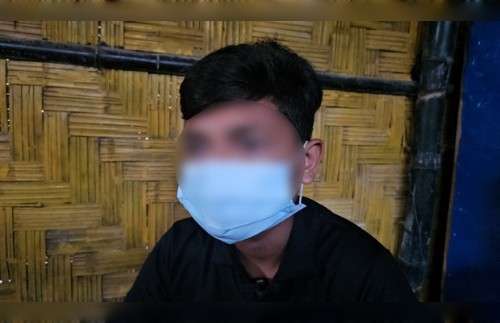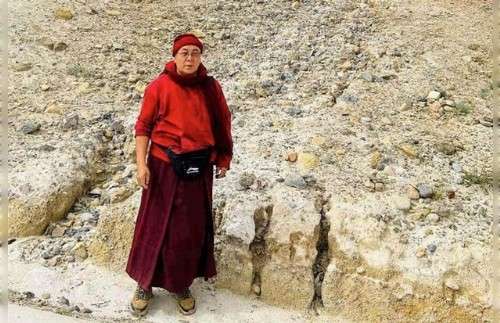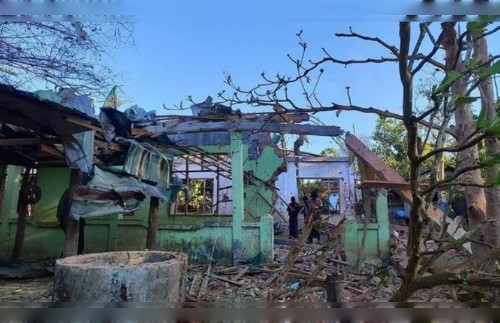Nontarat Phaicharoen,Bangkok

Two decades after the disappearance of human rights lawyer Somchai Neelapaijit, his case continues to reverberate in Thailand.
Somchai’s abduction from a Bangkok Street sparked a long campaign for stricter anti-torture legislation – which was finally passed in 2022 – while his wife, Angkhana Neelapaijit, has emerged as a prominent human rights advocate.
However, his family has failed to get justice over the last 20 years for Somchai, who is believed to have been killed after he was taken, although his body was never recovered.
“I did not think that my life would change so dramatically. It was a traumatic period for our family, as we were suddenly in the middle of police and media attention,” Angkhana told BenarNews, recalling the period immediately after Somchai disappeared.
“I did not have time to process it with my children. It was indeed a difficult time.”
Back in 2004, Somchai served as chair of a Muslim lawyers group and held a key position on the human rights committee of another lawyers group.
He was also heading a high-profile lawsuit alleging torture of Muslim suspects by police in Thailand’s restive Deep South. In the predominantly Malay Muslim southern provinces, a separatist insurgency that originally began in the 1960s against mainly Buddhist Thailand, had reignited in January 2004.
On March 12, 2004, he was pulled out of his car in broad daylight on Ramkhamhaeng Road, a busy Bangkok street, never to be seen again. Somchai was 52 at the time.
According to rights watchdog group Amnesty International, five police officers were arrested soon after Somchai’s disappearance for allegedly forcing him into their car on that day. The Supreme Court acquitted them in December 2015.
Human Rights Watch said that the alleged abductors were police officers acting in retaliation for Somchai’s involvement in the lawsuits that alleged widespread police torture of Muslim suspects in the Deep South.
HRW said in a statement on Monday that the United Nations had recorded 76 enforced disappearance cases in Thailand since 1980.
“None have been resolved, and no one has ever been punished for these crimes, even after Thailand adopted a law in 2022 recognizing enforced disappearance as a criminal offense,” the New York-based group said.
Amnesty International was scathing about the law, called the Prevention and Suppression of Torture and Enforced Disappearance Act and that criminalizes enforced disappearances. It was passed in 2022, and was supposed to take effect in February 2023, with the Thai police requesting a delay in enforcing it.
“[W]ith a lack of cases on enforced disappearance reaching the court, the law is quickly becoming no better than the paper it is written on,” the London-based human rights group said in a statement Monday.
Adilan Ali Ishak, a human rights lawyer and former MP from southern Yala province is more optimistic about the law.
“This law will ensure people’s rights to justice are protected,” he told BenarNews. “It allows for a check and balance between officials and it helps encourage the officers to be more mindful of the people’s rights.”
BenarNews attempted to contact the Ministry of Justice spokesperson for comments about the anniversary but did not hear back.

Somchai’s disappearance motivated his wife, Angkhana, to also work in defending human rights. In the process, she has become a leading activist in the country.
“I want to create a legal system to prevent such a thing from ever happening again and bring the wrongdoers to justice,” Angkhana said.
She founded the Justice for Peace Foundation, an organization that helps victims of human rights abuses, and served as the national human rights commissioner.
Angkhana’s work has won her the prestigious Gwangju Prize for Human Rights in 2006 and the Ramon Magsaysay Award in 2019. In 2022, she became the first Asian woman member of the United Nations Working Group on Enforced or Involuntary Disappearances.
Apart from his wife, Somchai inspired other lawyers to fight for human rights and defend the people in the Deep South, said Abdulkohar Awaeputeh, chairman of the Muslim Attorney Centre Foundation in Pattani.
“Somchai was an ordinary lawyer who lived a simple life. But what he did was encourage others to be dignified lawyers, who adhere to the principles of the law and give people access to the justice process,” he told BenarNews.
Vaison Baneng, who works in the Thai Deep South as a human rights lawyer, said that Somchai had inspired him.
“When I was in school, I learned about what kind of cases Somchai was working on and how he disappeared,” he told BenarNews.
“When I engage in such cases myself, it makes me want to continue the work that Somchai left unfinished.”
Meanwhile, Thailand’s Minister of Justice, Tawee Sodsong, was a no-show at Chulalongkorn University in Bangkok, which had invited him to a seminar to mark 20 years of Somchai’s disappearance. The minister did not cite a reason for his non-attendance.
The new government of Srettha Thavisin has promised to ratify the International Convention on Enforced Disappearance, which Thailand signed in 2012, Human Rights Watch said in its Monday statement.
“But as we mark 20 years since Somchai’s disappearance, that promise remains unfulfilled. Another year should not pass without justice for Somchai and the other victims of enforced disappearance,” HRW said.
“The Thai government needs to deliver justice for them and their families, and for all Thais.”
Copyright ©2015-2024, BenarNews. Used with the permission of BenarNews.
















